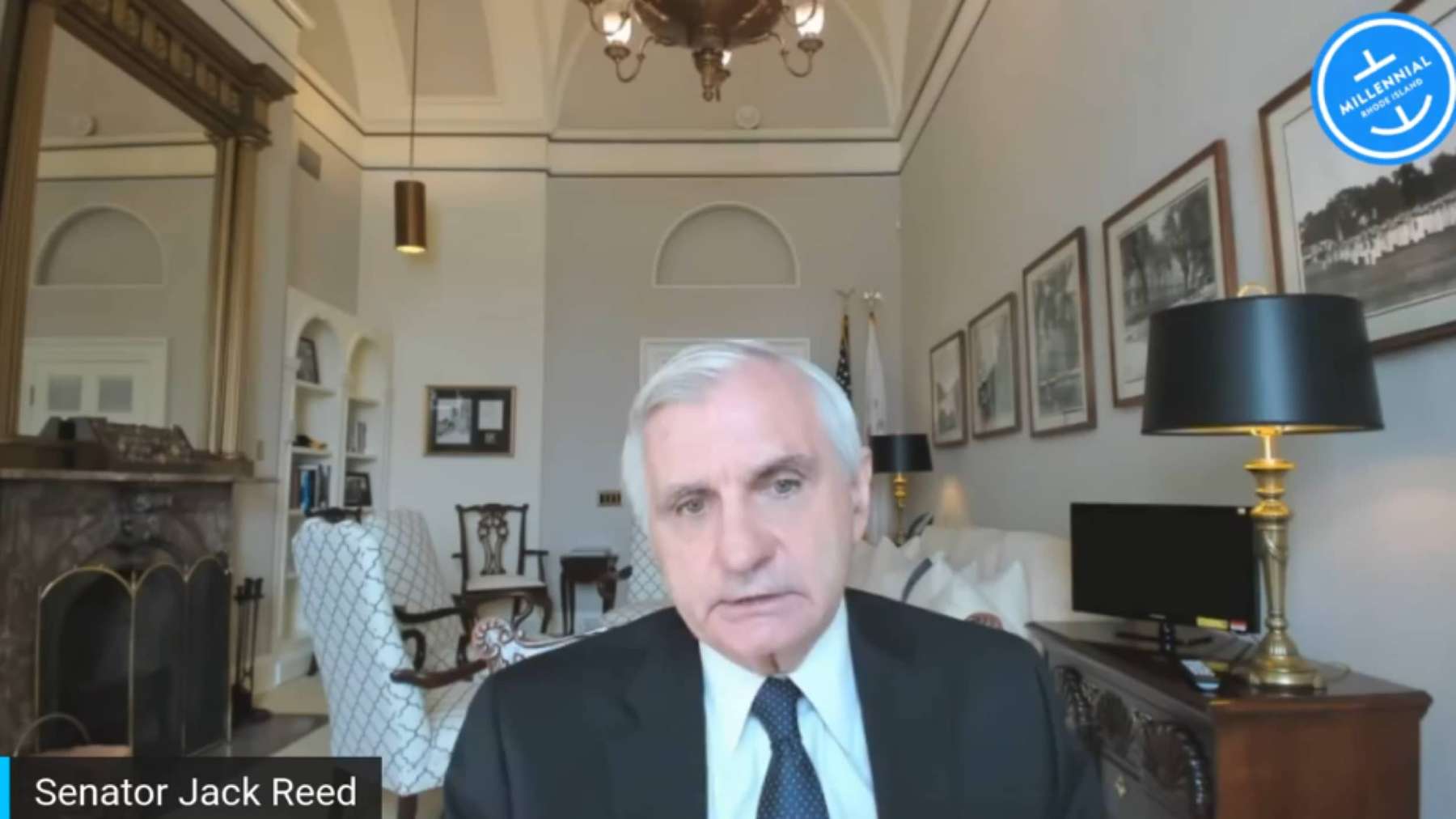Jack Reed takes questions from Millennial RI
“If you want to ask some people who feel strongly about climate change, ask a professional soldier or ask a professional military person. They are overseas in places like Pakistan and Afghanistan – they’re seeing climate change. They’re seeing drought. They’re seeing forces that are create tensions and violence. So this is not something that’s nice for the United States
September 14, 2020, 7:21 pm
By Steve Ahlquist
“If you want to ask some people who feel strongly about climate change, ask a professional soldier or ask a professional military person. They are overseas in places like Pakistan and Afghanistan – they’re seeing climate change. They’re seeing drought. They’re seeing forces that are create tensions and violence. So this is not something that’s nice for the United States and nice for our energy, this is a worldwide phenomenon that we have to deal with.“
United States Senator Jack Reed (Democrat, Rhode Island) spent an hour Monday afternoon with Millennial Rhode Island, answering questions live on Facebook. Reed has served as a Senator since being elected in 1996 and is currently seeking another six-year term in a race against Republican challenger Allen Waters. Reed is strongly favored to win re-election.
The interview was conducted by Travis Escobar and Chris Parisi.
After Senator Reed made an opening statement, he answered questions about the next (possible) stimulus package, health care, student debt, business, immigration reform, America’s racial reckoning, Covid, and more.
Reed called the recent racial reckoning on police violence against Black people an “existential problem with the United States” that’s “been within the fabric of our country since the beginning.”
The solutions to police violence against people of color in the country are not simply legislative, said Reed, “What we have to do is keep up the peaceful pressure of the demonstrations and then we have to think about constructive aspects.” That said, “In the wake of what’s been happening I’ve co-sponsored legislation that would require any police officer in riot control to have a name tag… You can’t hide behind anonymity.” Reed then pivoted to talking about the Affordable Care Act as a win for low-income people, and the need to fix our schools.
When Reed was asked about climate change he stopped short of endorsing the Green New Deal, and instead championed traditional neoliberal solutions, like passing legislation to encourage businesses to step in with solutions.
“I think the Green New Deal is a very positive direction. We cannot continue to do what we’re doing, just look around,” said Reed, noting the fires out west and the hurricanes down south. “Everywhere you turn, you’re looking at climate effects. We’ve got to fix this, and a Green New Deal, we’re talking about alternate energy and making progress in that regard is, I think, very important.
“Senator Whitehouse, my colleague, is very influential in this area and deserves a great deal of credit. But I’ve also been working for a while on some of these issues,” said Reed, citing legislation that allowed a big corporation to develop the off-shore wind farm near Block Island.
The kind of legislation that paved the way for industry to build the off-shore wind farms could be used to pave the way for alternative energy and electric vehicles, said Reed, pushing for public-private partnerships.
Reed had one final point on climate change:
“If you want to ask some people who feel strongly about climate change, ask a professional soldier or ask a professional military person. They are overseas in places like Pakistan and Afghanistan – they’re seeing climate change. They’re seeing drought. They’re seeing forces that are create tensions and violence. So this is not something that’s nice for the United States and nice for our energy, this is a worldwide phenomenon that we have to deal with.”
on the other hand, it should be noted that the United States military is a bigger polluter than as many as 140 countries.
Reed was asked what to do about the $1.7 trillion in student debt financially weighing down young and old Americans. Rhode Island is one of the top five states in the country in terms of student debt. Is it possible to simply cancel that debt? Reed didn’t address the idea of canceling that debt.
The CARES Act provided financial relief from some forms of student debt in terms of interest accumulating, noted Reed, but not all student debt. More generally, Reed would like the interest on student loans lowered as much as possible. “We should essentially subsidize the interest rates,” said Reed. “We should do that to have the lowest possible debt accumulating with the young people.”
Then, moving away from existing debt, Reed volunteered ways to make going to school more affordable, like increasing Pell Grants he also suggested “a program of two years of national service and four years of college would be excellent.”
As for immigration reform, Reed believes that with a Democratic president and control of both the House and the Senate, some sort of immigration reform bill will pass.
On healthcare, Reed said, “I think everyone has to have health care… If you look at any major, at least western country, they have a universal healthcare system and their health results are much better than the United States.”
Still, Reed seems to think an incrementalist approach is best, and balked at declaring healthcare a human right:
“I think we should allow state to expand their Medicaid programs to a significant level. They could choose the income level, so they get more and more people into the health care system. I think we should pass legislation at the federal level to allow people who are 50 or so to join Medicare.” Reed would also support legislation mandating that all children have access to adequate healthcare. “I think healthcare should be – everyone should have access, particularly children.”







